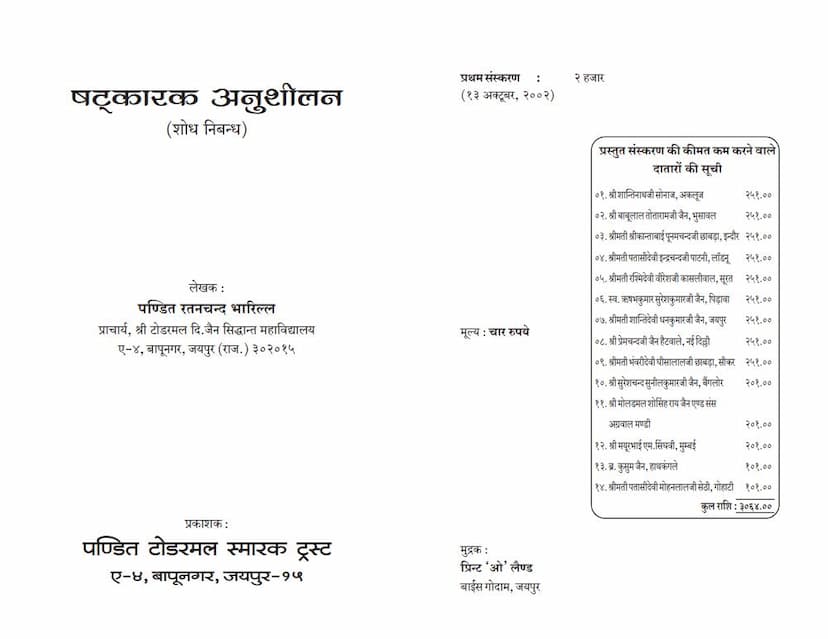Shatkarak Anushilan
Added to library: September 2, 2025

Summary
This document, titled "Shatkarak Anushilan" (Study of the Six Agents) by Ratanchand Bharilla, is a scholarly treatise exploring the concept of the "six agents" (Shaktkarak) within Jain philosophy. The book, published by Todarmal Granthamala Jaipur, aims to elucidate the significance of this principle in achieving liberation (moksha).
Key Themes and Arguments:
The central argument of the book is that understanding the "six agents" is crucial for grasping fundamental Jain principles such as the independence of substances (vastu swatantrya), the nature of cause and effect (karya-karan swarup), the relationship between doer and action (karta-karma), and non-absolutism (anekanta). The author emphasizes that without this understanding, the knowledge of a substance's true cause-and-effect mechanism remains incomplete, hindering the path to self-realization and self-reliance.
Nishchaya (Absolute) vs. Vyavahara (Conventional) Karakas:
The book extensively discusses the distinction between Nishchaya Karakas (Absolute Agents) and Vyavahara Karakas (Conventional Agents).
-
Nishchaya Karakas: These refer to the inherent nature of a substance where it acts as its own doer, action, instrument, recipient, source, and location. Each substance, in its purest form, is independent and performs its own actions without reliance on external factors. The text highlights that the soul (atma) itself, in its pure state of omniscience and supreme bliss, embodies all six agents. This self-sufficiency is what leads to the state of being "svayambhu" (self-existent or self-created). The author draws upon the teachings of revered Jain Acharyas like Kundakundacharya and Amritchandracharya, as well as modern commentators like Gurudev Shri Kanji Swami, to elaborate on this concept.
-
Vyavahara Karakas: These are conventional attributions where external factors are considered as agents, doers, or causes. For instance, a potter is conventionally considered the doer of a pot, the pot is the action, and the tools are the instruments. The book clarifies that these are conventional understandings and not the ultimate reality. While these conventional attributions are used in the worldly sense, the book stresses that they are ultimately illusory from the perspective of true liberation.
The Soul's Independence:
A significant portion of the book is dedicated to demonstrating the soul's absolute independence. It argues that the soul is the sole agent of its own modifications (paryaya) and actions. External substances, including karmic matter, cannot act upon the soul or make it act. The interaction is explained through the lens of "nimitta" (auxiliary cause) rather than "karta" (direct doer).
-
Cause and Effect: The text explains that while external factors might act as निमित्त (aids or conditions), the actual causality lies within the substance itself. For example, the sun may be a निमित्त for the blooming of a lotus, but the lotus's blooming is inherently its own process.
-
Freedom from Attachment: The understanding of Nishchaya Karakas is presented as the key to overcoming attachment and aversion (raga-dvesha). By recognizing that the soul is not dependent on external factors for its actions or experiences, one can detach from worldly pursuits and focus on self-realization.
The Six Karakas Explained:
The book meticulously defines each of the six karakas:
- Karta (Doer): The independent agent of an action.
- Karma (Object/Action): That which is acted upon or the action itself.
- Karan (Instrument): The means or tool by which an action is performed.
- Sampradan (Recipient/Beneficiary): That for which an action is done.
- Apadaan (Source/From which): That from which an action originates or from which something is separated.
- Adhikaran (Location/In which): The place or basis upon which an action occurs.
The book analyzes how these karakas, in their absolute sense, are all inherent within the soul itself.
Practical Implications for Liberation:
The core message of "Shatkarak Anushilan" is that true liberation is achieved by recognizing and internalizing the soul's self-sufficiency as described by the Nishchaya Karakas. By relinquishing the erroneous belief in external agency and understanding that the soul is its own doer, experiencer, and ultimate controller, an individual can embark on the path of self-purification and ultimately attain moksha. The book serves as a guide for practitioners to reorient their understanding from conventional causality to the absolute self-causality of the soul.
In essence, the book is a profound philosophical exploration of the soul's inherent independence and the means to realize this truth, advocating for a shift in perspective from external dependence to internal self-reliance for spiritual progress.